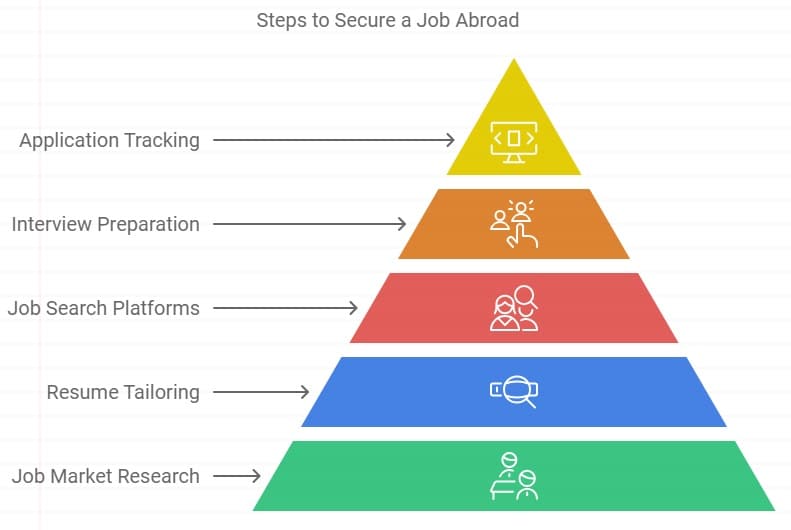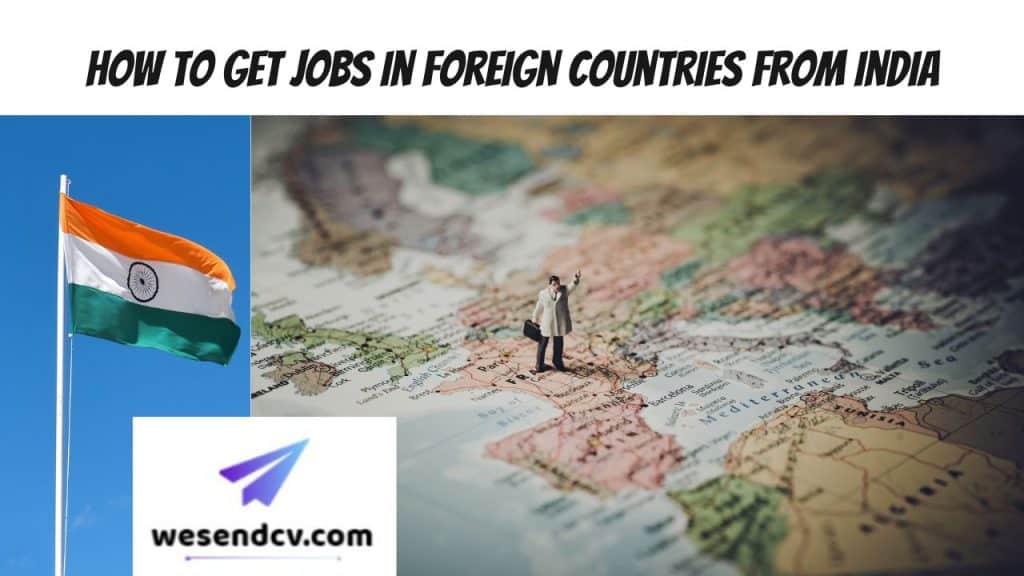Securing a job in a foreign country is a dream for many Indian professionals. Whether it’s the promise of higher salaries, better career opportunities, or the experience of living and working abroad, international employment has numerous advantages. However, the process of finding and securing a job in a foreign country can be complex and requires a systematic approach.
This guide will walk you through the essential steps to successfully land a job in a foreign country from India. From preparing your resume to optimizing your job search, this article will provide valuable insights to help you make your dream of working abroad a reality.
Main Highlights of Content
Toggle1. Research Job Markets and Opportunities in Foreign Countries
The first step in securing a job abroad is to thoroughly research the job markets of your target countries. Each country has different industries in demand, job requirements, and visa policies.
High-Demand Sectors in Key Regions
- United States and Canada: There is high demand for IT professionals, healthcare workers, engineers, and data scientists. Tech companies in Silicon Valley or Toronto, for example, often hire skilled workers from India.
- Europe: Countries like Germany, Sweden, and the Netherlands require IT experts, healthcare professionals, and skilled engineers. The EU Blue Card provides a straightforward path for non-EU professionals.
- Middle East: In countries like the UAE, Qatar, and Saudi Arabia, there is significant demand for professionals in construction, oil and gas, healthcare, and finance.
Each country has specific requirements, so it’s essential to target those that have industries aligned with your skill set.
Understand Visa and Work Permit Regulations
Each country has different rules when it comes to hiring foreign workers. For example:
- US: The H-1B visa is a popular option for skilled professionals.
- Canada: The Express Entry system is a great pathway for skilled workers.
- Germany and Europe: The EU Blue Card makes it easier for highly skilled workers to move to the EU.
Before applying for jobs, ensure that you are eligible for the country’s visa and work permit process.

2. Tailor Your Resume for International Job Markets
Your resume is your first impression on potential employers, so it’s important to make it stand out. Resumes for international markets differ from those in India, so customizing your resume for foreign employers is essential.
Optimize for Applicant Tracking Systems (ATS)
Most employers, especially in larger companies abroad, use Applicant Tracking Systems (ATS) to filter resumes based on keywords. To make sure your resume passes through ATS filters:
- Use Keywords: Incorporate keywords from the job description, such as specific skills, qualifications, and experience, into your resume.
- Clear Formatting: Keep your resume layout simple and easy to read, avoiding complex designs that might confuse ATS.
For more tips on how to optimize your resume for international jobs, you can use the Free Resume Tools to ensure it is structured correctly.
Highlight International Experience and Transferable Skills
If you have worked with international clients or on cross-border projects, emphasize this in your resume. International employers value candidates who have experience working in multicultural environments. Additionally, focus on highlighting transferable skills, such as communication, adaptability, and leadership.
To evaluate how effective your resume is, consider using the Resume Score Check Free to get feedback and improve your resume before applying.
3. Use Job Search Platforms and Networking for Global Opportunities
Finding a job abroad requires the right tools and networks. Job portals, networking, and even recruitment agencies can help you find international job opportunities.
Top Job Portals for International Jobs
- LinkedIn: This is an excellent platform to connect with professionals in your desired country and apply for jobs listed globally.
- Indeed: Offers a wide variety of job listings from countries across the globe, including the US, Europe, and the Middle East.
- Glassdoor: Provides job listings, salary information, and reviews from employees, which can be helpful when researching potential employers.
Leverage Professional Networks
Networking plays a crucial role in finding job opportunities abroad. Connecting with professionals, recruiters, and industry leaders in your target countries can help you discover hidden job opportunities or get referrals for jobs that are not publicly advertised.
Attend online job fairs, join LinkedIn groups, and participate in webinars hosted by companies or industry associations in your field.
4. Prepare for International Job Interviews
Once your resume gets shortlisted, you will likely face several rounds of interviews. International interviews might differ from what you’re used to in India, so preparing for them is crucial.
Mastering Virtual Interviews
Since most initial interviews will be conducted online, make sure that:
- You Have a Reliable Internet Connection: Poor connectivity can create a bad impression.
- Professional Background: Ensure your surroundings are clean, quiet, and free from distractions during your interview.
- Dress Formally: Even if the interview is virtual, dressing professionally shows your seriousness and respect for the interviewer.
Understand Cultural Differences in Interviews
Interview styles can vary greatly depending on the country:
- In the US: Interviews are often more conversational and informal, focusing on your experience and potential culture fit.
- In Europe: Interviews may focus more on your technical qualifications and ability to work in structured environments.
- In the Middle East: Building personal rapport and trust may be just as important as your qualifications.
Prepare for Common Questions
Prepare for interview questions about why you want to work abroad, how you handle cross-cultural environments, and what skills you bring to the table.
For more help preparing for interviews, you can use the Job Interview Preparation Helper, which offers tips and strategies to ace your interviews.
5. Use Google Search Operators to Find Niche Job Listings
Sometimes, finding the perfect job abroad can mean going beyond traditional job portals. Using Google Search Operators can help you find specific job openings that may not appear on major job boards.
How to Use Google Search Operators:
- Search Specific Job Titles: Use quotation marks to search for exact job titles, e.g.,
"Software Engineer jobs in Germany". - Exclude Irrelevant Results: Use the minus operator (
-) to filter out unwanted listings, e.g.,"marketing jobs in Canada -internship". - Site-Specific Searches: Use the site operator to search specific job boards or company sites, e.g.,
site:linkedin.com "data analyst jobs in the US".
These tools can make your job search more efficient by delivering more relevant results.
To help refine your job search process, use the Google Search Operator Generator, which simplifies the creation of advanced search queries for job hunting.
6. Keep Track of Applications and Deadlines
Applying for jobs abroad can involve submitting multiple applications, attending various interviews, and tracking numerous deadlines. Staying organized is critical to ensuring that you don’t miss out on any opportunities.
Use a Job Application Tracker
To manage your applications efficiently, consider using a Job Application Tracker. This tool will help you:
- Track Submitted Applications: Keep tabs on where you’ve applied and the status of each application.
- Set Reminders: Get reminders for follow-up emails or interviews.
- Stay on Top of Deadlines: Ensure that you never miss important deadlines for applications or visa documents.
7. Understanding Visa and Work Permit Requirements
Once you’ve secured a job offer, the next step is understanding and navigating the visa process. Each country has its own visa policies, so it’s important to prepare for the visa application process well in advance.
Common Work Visas for Indian Professionals
- H-1B Visa (USA): Allows US employers to hire foreign professionals in specialty occupations.
- Express Entry (Canada): A points-based system that offers Permanent Residency for skilled workers.
- EU Blue Card (Europe): A work visa for highly skilled professionals to live and work in the EU.
- Middle East Work Visas: These are usually employer-sponsored visas for countries like the UAE, Qatar, and Saudi Arabia.
Employer-Sponsored Visas
In many countries, your employer will need to sponsor your visa. Make sure to clarify the visa sponsorship process with your employer during the job offer stage.
Conclusion
Finding a job in a foreign country from India is an exciting and rewarding challenge that requires careful planning, research, and preparation. By understanding the job market, tailoring your resume, and utilizing tools such as Free Resume Tools and the Google Search Operator Generator, you can greatly improve your chances of landing a job abroad.
Once you start applying for jobs, make sure to track your applications using the Job Application Tracker and prepare thoroughly for interviews with the help of the Job Interview Preparation Helper. By following these steps and avoiding common pitfalls, you will be well on your way to starting a successful career abroad.







